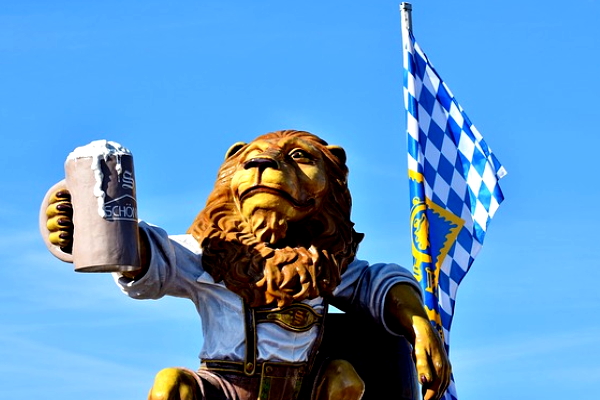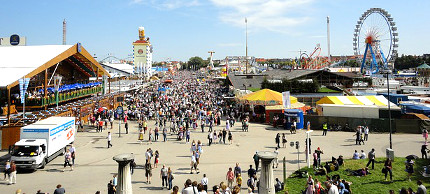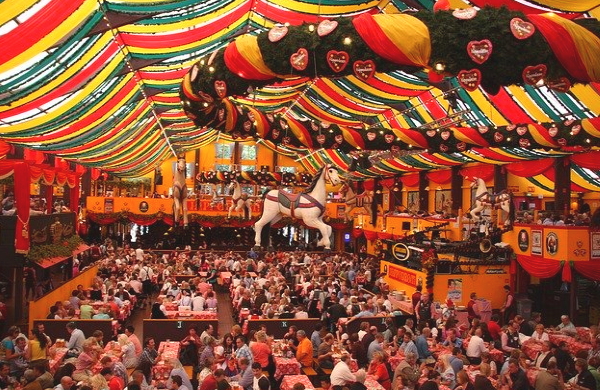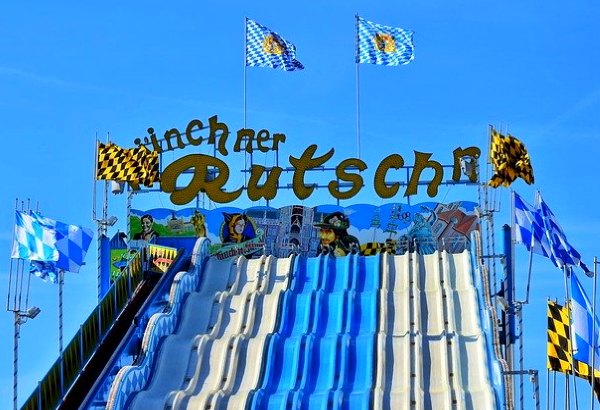Oktoberfest in Munich is the largest beer festival in the world and one of Germany’s most famous events. Every year, millions of visitors travel to Bavaria’s capital to experience traditional beer tents, Bavarian music, fairground rides and a unique festive atmosphere.

The festival takes place on the Theresienwiese, a large open area southwest of the city center. During Oktoberfest, Munich becomes the global center of beer culture.
This guide explains everything you need to know about visiting Oktoberfest in Munich: history, beer tents, reservations, costs, tips and practical information.
Oktoberfest Tours & Experiences
Guided Oktoberfest tours help first-time visitors navigate beer tents, reservations and Bavarian traditions.
History of Oktoberfest
Oktoberfest began in 1810 as a wedding celebration for Crown Prince Ludwig (later King Ludwig I) and Princess Therese of Saxony-Hildburghausen. Citizens of Munich were invited to join the festivities on a large meadow outside the city walls.
The event was such a success that it was repeated the following year and gradually developed into the beer festival we know today.
The festival grounds were named “Theresienwiese” (Theresa’s Meadow) after the bride.

When Does Oktoberfest Take Place?
Despite its name, Oktoberfest begins in late September and usually ends on the first weekend in October. The festival lasts about 16–18 days.
The Beer Tents
The heart of Oktoberfest is its large beer tents, each operated by one of Munich’s traditional breweries.
Major tents include:
- Hofbräu-Festzelt
- Schottenhamel
- Augustiner-Festhalle
- Paulaner Festzelt
Each tent has its own atmosphere. Some are known for party vibes, others for traditional Bavarian style.

Beer at Oktoberfest
Only Munich’s six traditional breweries are allowed to serve beer at Oktoberfest. The beer is specially brewed for the festival and slightly stronger than regular lager.
Beer is served in one-liter mugs called “Maß.”
Traditional Clothing
Many visitors wear traditional Bavarian outfits:
- Dirndl (for women)
- Lederhosen (for men)
Although not mandatory, wearing traditional clothing enhances the experience.
|
Day excursion from Munich There are great day tours by bus to the world famous Neuschwanstein Castle from Munich. The best tour also stops at other famous places in the area like Linderhof. |
Fairground Rides and Attractions
Oktoberfest is also a large funfair with:
- Roller coasters
- Ferris wheels
- Haunted houses
- Games and food stalls
Families often visit during daytime when the atmosphere is calmer.

Reservations and Seating
Reservations for beer tents are recommended, especially on weekends and evenings. Without a reservation, entry depends on available seating.
Arriving early in the day increases your chances of finding a seat without booking.
Costs
- 1 Maß beer: typically over €12–14 (prices vary annually)
- Food: €15–25 per main dish
- Rides: separate ticket prices
Oktoberfest is not cheap, but the atmosphere is unique.
How to Get to Oktoberfest
The festival takes place at Theresienwiese:
- U-Bahn: U4 and U5 to Theresienwiese
- Walking distance from Munich Central Station
More travel information:
Book Hotels Early for Oktoberfest
Accommodation prices rise sharply during Oktoberfest. Booking several months in advance is strongly recommended.
Pros and Cons
Pros
- Unique cultural experience
- Traditional Bavarian music and beer
- World-famous atmosphere
Cons
- Crowded and noisy
- Expensive
- Accommodation fills quickly
Is Oktoberfest Worth Visiting?
Yes, especially if you want to experience Bavarian culture at its most festive. However, it is crowded and commercial, so it may not suit travelers seeking a quiet cultural experience.